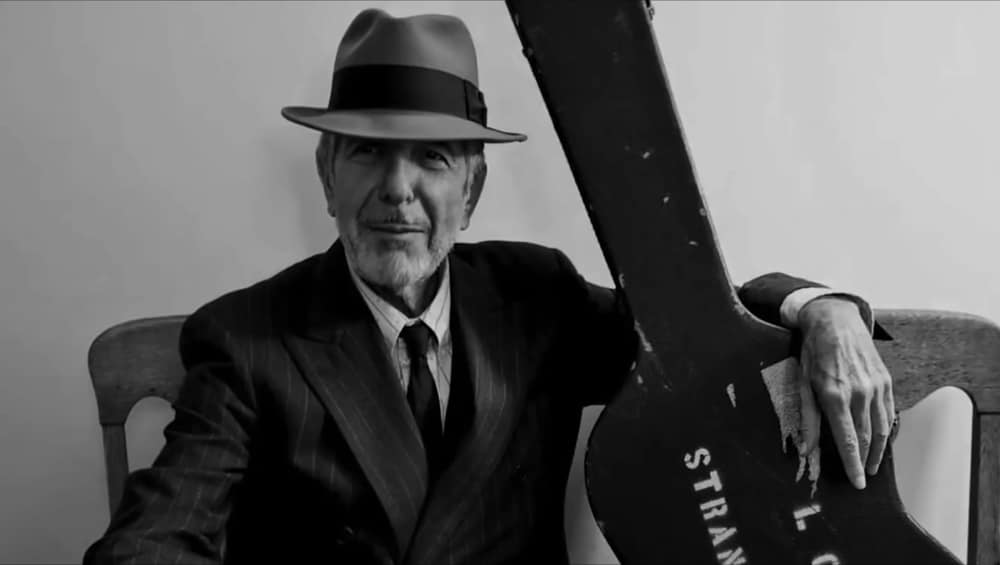




Dir.: Dan Geller, Dayna Goldfine; Documentary with Leonard Cohen, Larry ‘Ratso’ Sloman, Sharon Robinson, Judy Collins, Regina Spector, Clive Davis, Amanda Palmer, Rufus Wainwright; USA 2021, 118 min.
Canadian singer, poet and novelist Leonard Cohen (1934-2016) once again comes under the spotlight in this passionate but objective new documentary from Dayna Goldfine and Dan Geller (who also serves as DoP).
The focus here is Cohen’s quest for spiritual meaning, culminating in the 1984 song, Hallelujah. Inspired by “The Holy and the Broken” by author Alan Light, the directors have cleverly put together a piece of musical history, backed by prodigious researc.
Cohen was born into a wealthy Jewish family in Montreal and stayed faithful to his religion even though for a time, in the late 1990s, he was drawn to Zen Buddhism and lived for a few years at the retreat of Zen master Kyozan Joshu Sasalli Roshi on Mount Baldy. Cohen was a renowned womaniser unable to commit to family life. He bought the Greek island of Hydra in the 1960s where he enjoyed a long relationship with Marianne Ihlen, for whom he wrote “So long Marianne”. They both died only a few months apart (of leukaemia). Cohen’s last love letter formed the eulogy at Ihlen’s funeral. In the 1970s Cohen lived with Suzanne Elrod, the couple had two children, but “Suzanne” was actually written for Suzanne Verdal. Cohen shared most of the 1980s with the fashion photographer Dominique Isserman with whom he also collaborated on work projects. Actress Rebecca de Mornay also shared professional achievements with Cohen.
Even before Hallelujah was made globally famous by the animation feature Shrek (2001), Cohen wrote songs for Robert Altman’s noir Western McCabe and Mrs. Miller (1971). The original reaction to Hallelujah on the 1984 album ‘Various Positions’ was anything but promising: Columbia Music CEO Walter Yetnikov was less than enamoured, and the album was not released in the USA. The original version was produced by the small record label ‘Passport Records’ a year later. Cohen was not the only one to record the song, the most famous versions are by Jeff Buckley (who died shortly afterwards in a swimming accident), John Cale, KD lang and Brandi Carlisle. Rufus Wainwright was supposed to perform Shrek for the feature but the producers decided at the last minute to go with John Cale’s version “because it fitted better with the character of the titular protagonist of the feature”. But Wainwright did not lose out completely, his version was used for the sound track version.
Many ‘famous’ moments from music history are touched upon: the meeting between Dylan and Cohen in Paris, comparing the time the composers spent on their songs, with Dylan (15 minutes in the back of a taxi) the clear winner, since Cohen honed Hallelujah to perfection in over seven years using about 200 verses. Rolling Stone music critic Larry ‘Ratso’ Sloman, friend of Dylan and Cohen, is the most animated witness, trying to come to terms with Cohen’ ‘split’ personality, best described by the man himself: You either raise your fist, or sing Hallelujah. I did both”.
In spite of the long running time, for once justified, Hallelujah is chockfull of juicy titbits, keeping us enthralled for nearly two hours. The legendary star found himself making a successful comeback, touring the globe after his business manager absconded with all his money, including his pension fund. He leaves behind him an oeuvre suffused with languid longing, words and music full of sentimental low level depression.AS
IN CINEMAS FROM 16 SEPTEMBER 2022